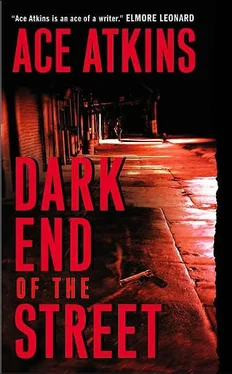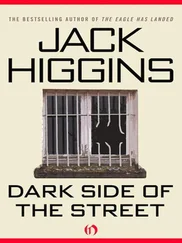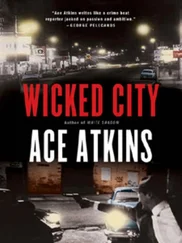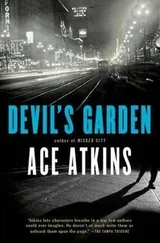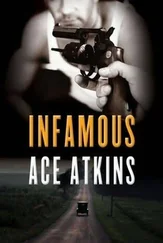I didn’t. I was scared.
“You Wordie?”
“Maybe. Who the fuck is you?”
“A friend of Clyde’s.”
She crossed her arms over her massive breasts, the left one adorned with a tattoo of a red rose.
“His sister’s trying to find him.”
“Listen, I got to go,” she said, trying to close the door. I could hear the chatter of Oprah Winfrey inside.
“What’s Oprah talkin’ about today?”
Wordie gave me a frown. “Oh, I don’t know. Some woman givin’ advice to women whose got husbands that peckers don’t work.”
“You married?”
“Hell no,” she said, giving a little laugh, then catching herself and then trying to close the door again.
“His sister Loretta sent me.”
Wordie put her hands on her massive hips and said, “You know Loretta Jackson?”
“She’s family.”
“Hmm.”
“She’s like family.”
“Really?”
I nodded.
“C’mon in,” she said, leaving the wood door to batter the frame. I followed her inside to Oprah and the smell of smoked meat and greens.
The greens were great. Firm and salty, but with that smoky flavor that tasted like home and JoJo’s and everything I valued. I liked Wordie, and for the moment Wordie seemed to like me. Well, she acted like she liked me in between commercials and Oprah – which did truly feature stories about men whose peckers didn’t work – as she showed me old brown vinyl picture albums containing clippings on Clyde James that dated back to 1964 and his work in gospel.
“Do you think I could borrow this sometime?” I asked. “Would love to make copies of these articles.”
She looked at me, her face pinched tight, and then back at the television.
I turned back to the newspaper clippings that were yellowed and worn thin from constant reading. I flipped to a page with an article whose headline read WIFE OF NEGRO MUSICIAN EXECUTED. I slowly read the story, the page smelling like mothballs and silverfish:
MEMPHIS – Police discovered the bodies of two Negroes early Sunday morning in what detectives are calling an apparent execution.
The victims have been identified as Mary James, 29, and Eddie Porter, 33. James is the wife of Clyde James, a local singer. Porter played organ in James’ band, said Bobby Lee Cook, owner Bluff City Records.
According to Detective Ray Jenkins, Memphis Police Department, the bodies were found at the James’ home, 433 Rosewood Ave. about 10 a.m. Both had suffered gunshot wounds to the back of the head.
Jenkins would not say if the department had any suspects. No arrests have been made.
Cook said Clyde James has reached national success with a recent chart topper called “Lonely Street.” He said James was devastated when he learned of the death of his wife and friend. Cook said the singer is with family and members of the First Zion Church.
“Eddie Porter was one of the finest musicians I’ve ever known and will be greatly missed by everyone in the Memphis’s recording industry,” Cook said.
As a police siren wailed in the distance, I took a deep breath and looked at the mildewed walls of Wordie’s apartment. Behind her couch, there was a mosaic of album covers and framed publicity stills of Clyde James. News from Billboard and press releases from Bluff City. Clyde James with a palm pressed against his thoughtful face and Clyde James wearing a smile of confidence that betrayed the dark depression.
I felt Wordie walk behind me. I could hear her breathing in the worn room and knew she wasn’t staring at me but at her fallen hero. Sunlight broke into the room and covered my face with momentary warmth.
“I tried to get him help, mister. I tried.”
“He’s alive.”
She didn’t answer.
I didn’t turn to face her, afraid that seeing my eyes would only make her skittish.
“I need to find him,” I said.
“He doesn’t want help,” she said. “People always take him away from me. But he come back. He always come back. This is where he need to be. I know what Clyde needs. He needs love. That’s it.”
A new show blared from the television, this one about cheating wives and double-crossing and there was a lot of whoops and hollering. She picked up my bowl of greens and walked back to the kitchen.
She only had an old sofa covered in a faded flowered bedspread, one dinette set chair, and a coffee table made of concrete blocks and a piece of warped wood. In the center sat a milk crate that overflowed with envelopes. Must’ve been dozens of them. Most were marked URGENT in huge red letters.
Wordie waddled back and stood in front of the television and sighed.
“I usually don’t do this,” I said. “But the most I can give you is a hundred bucks.”
She looked back over her shoulder, smoothed the biker pants over her thighs, and licked her lips.
“I’ve got to find him,” I said.
Her face became a mixture of relief and apprehension.
“You say you know Loretta?”
“You can call her if you like,” I said.
She looked at the worn linoleum floor and shook her head. A pot in the kitchen rang every few seconds with leaking rainwater.
I reached into my wallet and pulled out five twenties, pretty much my budget for the next few days after treating myself to the Peabody.
I mashed the twenties into her waiting hand. It was oddly small but calloused and warm.
“Lots of folks been lookin’ for him,” she said. “Lots of folks don’t need to find him.”
“Like who?”
“People who don’t want to do him no good,” she said, tucking the money between the thick roll of fat on her waist and the tight pants. “I tole him about the men comin’ to see me a few weeks back. And he say he’s gone and ain’t seen him ’round since. You can go look for yourself, but ain’t gonna do you no good. He took off.”
“Was he living in that homeless camp ’round Piggly Wiggly?”
She nodded.
“Where else would he go?”
“Don’t know.”
I nodded at Wordie. Thoughtfully. Deliberately. You can trust me.
I asked, “Who was looking for him?”
“Big old dudes with muscles,” she said. “I git ’em if they come back.”
“How you going to do that?”
“I ain’t stupid,” she said. “When they was leavin’ I wrote down their damned tag number.”
Twenty minutes later, after waiting for a call back to a pay phone at a Popeye’s on Poplar, I got an answer. The car was a black Lincoln registered to a casino in Tunica, Mississippi, called the Magnolia Grand.
Just thirty miles south on Highway 61.
UNTIL A FEW YEARS AGO, Tunica was known as the poorest city in the poorest county in the poorest state in the whole nation. Jesse Jackson once called it the Ethiopia of America. Now it’s the third largest gambling mecca behind Las Vegas and Atlantic City. A damned county whose only hope for the future was catfish and cotton now has marquees with tiny white lights advertising loose slots and off-Broadway shows.
The late evening sky seemed lower and harder here than in Memphis, I noticed as I drove south along Highway 61 listening to the North Mississippi All-Stars jamming their version of K. C. Jones, a mighty man dead and gone. The horizon burned a bright orange, yellow, and blue leaving the tin-roofed farmhouses bleeding with rust and kudzu-covered trees, growing brown, in broken shadows.
Farm supply stores soon gave way to pawnshops and liquor stores blazing with neon. Old diners turned to outlet malls. It was as if George Bailey’s nightmare of Pottersville had descended on the Mississippi Delta.
I could feel the needle pricks of a fall chill through the open windows of my Bronco and smell the burning rows of dead leaves outside battered trailers and prefab homes. Agriplanes sat parked outside small hangars while rusted Oldsmobiles and Buicks stood restless outside tired motels.
Читать дальше
